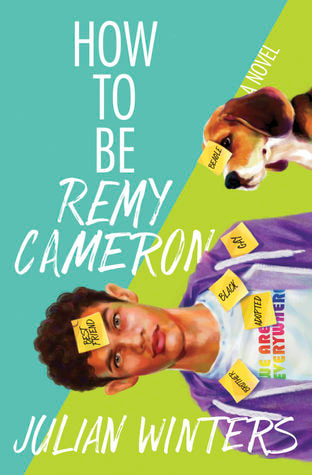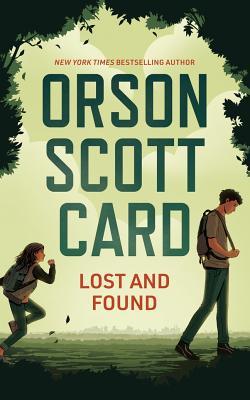|
Everyone on campus knows Remy Cameron. He's the out-and-gay, super-likable guy that people admire for his confidence. The only person who may not know Remy that well is Remy himself. So when he is assigned to write an essay describing himself, he goes on a journey to reconcile the labels that people have attached to him, and get to know the real Remy Cameron. (From the book blurb) My thoughts: A heartfelt, emotional book on authenticity, expectations, and courage to be yourself. The protagonist, 17-year-old Remy Cameron, is in his junior year of high school. He would like to go to Emory College, so that he can be closer to his family -his wonderful, supportive parents and his seven year old sister Willow. Remy might look different from his parents and Willow, but he is very much a part of his family. He is also lots of other things: honest and brave (he came out at 14 and is the President of Maplewood school Gay Straight Alliance Club), confident and popular. When his AP Lit teacher, who he really looks up to, sets an essay on the topic of Identity, Remy is torn. He would like to do his best to write a great essay, but he is afraid he might fail, because he doesn't really know what he is. We have no control over what labels others give us, but we can define who we are by the ones we choose to give ourselves. This is not a plot-driven book, it is very introspective, despite its light and upbeat tone. The main issue is of course that of labels (you can call them statuses we assign ourselves or get assigned by other people). You can of course see yourself as a family member- Remy's is the firstborn of his family, which comes with privileges and responsibilities. His Dad also chose a University closer to his home so that he could help his younger brother. Remy is a doting brother. He adores Willow- how can you not? her fashion choices are beyond charming. He also thinks a lot about his parents' marriage, and is probably subconsciously trying to work out a model for his future relationships. Remy's family understand and support him. I loved the scene when he accidentally meets his ex and his mom senses Remy's feelings straightaway and difuses the situation. He is adopted, which comes with a whole set of questions to ask himself. You can also see yourself as a friend or a student of a particular school. Remy's friends are a very diverse group. I must admit I thought that perhaps there were too many secondary characters, but then again, we meet so many people in our lives, some of which are going to stay on the periphery, helping us to define our core group of support. Does being black define him? Remy doesn't know anything about his biological parents- not that it has been a problem so far, although we see in the book that he is very much aware of what it means to be one out of the five black students in his school, although his friend Brook is more vocal about racism and racial fetishism. When Remy meets his biological half-sister, some of his questions get answered. he also tells him that although he needs to know his history, the struggles and the victories, these things do not define who he is. They are just a part of him. Although Remy's sexuality is a big part of him, it isn't all. When the school counselor keeps suggesting universities with a strong LGBTQIA presence, Remy knows she isn't even trying to see him as a whole, but only as somebody who can be pigeonholed and fast-tracked to success, defined by other people. Mrs Scott sees me as a gay, black teen she can guide to success... My world is filled with identities overshadowing who I am. Who I think I am. When we meet Remy, he is already pretty much over the break up of his first serious relationship. As we all know, being in or out of a relationship can also be a powerful label/ status. Some students at his school will only see or recognise him as an ex-boyfriend of another popular student. I really liked the slow-burn romance in this book, and the way the author discusses the importance of consent in a subtle way. It isn't just in Ian's asking 'Can I hold your hand?'- yes, you should be aware that not everybody is comfortable with being touched, and not everybody is comfortable with sharing personal space, to say nothing of taking a relationship to a new level. It is also in Remy's sensitivity towards a friend who might or might not want to join GSA club. He is very careful not to impose his help or support, or make assumptions about people needing them. I found Remy's reflections on his coming out very perceptive: The thing is, you always have to come out. Every day. To new people, to people you have known forever, to people who keep trying to ignore it. This is it. You reveal yourself, who you think you are, to people around you. Every day. To people who love and know and support you. To new people. With some of them, it is going to be easy, with others - awkward. Yet another group of people will not accept you or care or even acknowledge that you exist and are a unique human being. You will always remain invisible or pigeonholed to them. We also change as we go through our lives and some of the facets of our identity, personality and experience become more prominent, while others fade away or become a distant history. We reveal ourselves to people around us, this is our right and our privilege to be what we think we are, not what somebody else expects us to be. Thank you to Edelweiss and Duet Books for the ARC provided in exchange for an honest opinion. A compelling read, written in a very simple and engaging way, the book touches upon some very dark topics, so I probably wouldn't recommend it to middle graders, but rather to slightly older teenagers. The protagonist Ezekiel is 14 years old, so perhaps this is the target age, although the story flows so easily that you might first think it was written for younger audience.
Ezekiel Bliss (or Ezekiel Blast as he keeps calling himself -names are important to him) is an outsider. In fact, other teenagers give him a wide birth and even crss to the other side whenever he approaches. The reason for all this is that Ezekiel has a reputation of being a thief and who would like to be friends with somebody you cannot trust? One day a girl from his school, short enough to seem to be a six or seven year old, although she is actually 13, starts walking next to him. She also tries to engage him into a conversation and break into Ezekiel's 'shunning bubble'. Beth is the first and only person who actually wants to know his real story. It turns out Ezekiel has never stolen a single thing in his life. it's just that he has a special talent. Lost objects seem to call to him and ask to be returned to their rightful owners. When it started happening, Ezekiel was just six and returned his first object- a newand shiny bike- and was promptly accused of having stolen it in the first place. Years and years of police interviews and pages and pages in his school and police files, Ezekiel learnt a few survival techniques.First of all, never return the object directly. Secondly, do not trust the authorities, including teachers, school counsellors and police officers. When a new counsellor suggests that Ezekiel should join a scientific study, his father first checks this is not a new attempt to make his son have therapy 'to cure him of something'. The Group of rare and Useless Talents (GRUT) meets once a week and does resemble group terapy sessions, although the main objective is to let the teenagers understand the limits of their micropowers (as opposed to 'superpowers') better. Some of them are uttely bizarre such as knowing if somebody's navel is of an in or out kind or forcing somebody yawn in an uncontrolled manner. Beth encourages Ezekiel to do a few experiments to see how far his own unusual talent extends. Unfortunately, Ezekiel and Beth fall out and she walks away without the protection of Ezekiel's company. Because this is exactly what she needed him for first- protection from school bullies ready to pounce on a little defenceless person. Only then they became friends, unlikely, improbable, mismatched friends, who would do anything for each other. When Ezekiel is asked by a police officer to help him find a kidnapped little girl, he cannot even share the story with Beth who appears to have gone somewhere with her mother. But has she really? The story makes a compulsive reading. There are twists and turns, and dark discoveries that made me revise my initial idea of the target audience. It did raise a question of what kind of topics we should include or exclude from YA books. The content warnings for this book include: death of a parent, child kidnapping and child pornography. There are no graphic descriptions and the issues are dealt with maximum sensitivity. Should we let our children that, although mercifully rare, these things exist? We do not learn much about the main villains in the book (apart from a few details about one of the kidnappers), so the picture is black and white here. Ezekiel and Beth make fantastic protagonists. Despite the dark things that happened to them, they are still typical teenagers: smart and sarcastic, looking for love and friendship, exploring what their limits are and what they can do to make a difference in other people's lives. The relationship between Ezekiel and his father was so loving and tender that it brought tears to my eyes. The police officer who trusted Ezekiel to help him with the investigation is a secondary character, but he also helps to explore some very important questions such as what does it mean to be friends with somebody, especially if we are talking about different ages. The GRUT guys deserve a special mention. I would have loved to get to know them better, but I do understand that to keep the story focused and streamlined, the author needed to make some sacrifices. A moving story of finding friends and dealing with loss, Lost and Found is a powerful book that explores important topics in an absorbing and highly readable way. Thank you to NetGalley and the publisher for the DRC provided in exchange for an honest opinion. |
Archives
March 2024
Categories
All
|


 RSS Feed
RSS Feed
